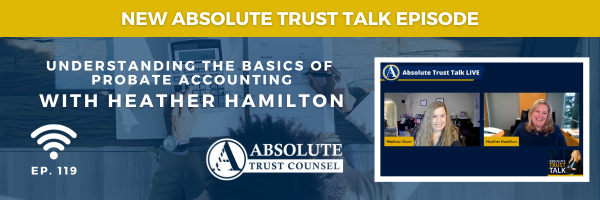Aunt Minnie may appear to be a little flighty and forgetful, but does that mean she is incapable of creating and legally executing (signing) a will?
The answer is complicated. The preparation of an estate plan, which may include a will, trust, and/or other documents, involves many steps. Assets and liabilities must be identified and decisions need to be made about their disposition upon death. Documents need to be drafted to accomplish the estate owner’s wishes in a cost-effective and tax-advantageous manner. Executors and Powers of Attorney must be appointed. But the most important step in the entire process is the assessment of “testamentary capacity.”
In simple terms, testamentary capacity is the ability of a person to not only legally sign estate planning documents, but also to fully understand what they are signing. Unfortunately, testamentary capacity is not black or white. There are many gray areas.
Legally, everyone is presumed to be competent. However, that presumption may be challenged in court. If the challenge is successful, the court will invalidate the estate planning documents, leaving the assets to be distributed under state probate law, often in ways not intended by the owner of the estate.
That’s why one of the first determinations an estate planning attorney makes is whether testamentary capacity will be an issue. In California, lack of testamentary capacity does not refer to physical or mental disorders, but rather to one of three factors: The inability of a person to understand and sign estate planning documents, the presence of an unsound mind or the possession of a mental deficit “so substantial that, under the circumstances, the person should be deemed to lack…legal capacity.”
Age, illness or diseases are not factors in the determination of testamentary capacity. A party can be well into their 90’s, or suffer from a debilitating disease, and still have the capacity to legally sign a will. Under state law, deficits that may affect testamentary capacity are divided into four categories:
- Alertness and attention, including poor arousal or consciousness; a weak orientation to time, place, person, and situation; and/or an inadequate ability to concentrate.
- Information processing, such as deficits in short or long-term memory; the inability to understand or communicate with others; the lack of recognition of familiar objects and people; the inability to understand and appreciate quantities; the inability to reason using abstract concepts; an inferior ability to plan, organize, and carry out actions in one’s own rational self-interest; and/or the inability to reason logically.
- Thought processes, including severely disorganized thinking, hallucinations, delusions, and uncontrollable, repetitive, or intrusive thoughts.
- The ability to modulate mood and effect, defined as the presence of a “pervasive and persistent recurrent state of euphoria, anger, anxiety, fear, panic, depression, hopelessness or despair, helplessness, apathy or indifference, [which] is inappropriate in degree to the individual’s circumstances.”
The presence of one or more of these factors does not necessarily mean someone is incapable of making decisions regarding their estate or signing related legal documents. The frequency, severity, and duration of any impairment are determining factors. For example, an illness or prescribed medications may influence testamentary capacity at a certain point in time, but once those health issues are resolved, the impairments may disappear. In addition, the law requires that the estate holder be competent only at the time a will or estate planning document is signed. For some, incompetency may not be a persistent condition. A person can be deemed legally competent when a will is executed, but become incompetent a short time later.
The duty of an attorney is to ensure that competency exists when the relevant estate planning documents are signed. There is no legal obligation to assess testamentary capacity at any other time.
Generally, evaluations of mental capacity are made by the courts or health care providers. However, family members, attorneys, and other advisors play a critical role in identifying the need for such an assessment. For example, a family member may notice that a parent has difficulty remembering people, appointments, and/or key events, indicating significant memory loss. An attorney may find a client is unable to effectively communicate their desires, or cannot make decisions independently. In addition, if testamentary decisions are likely to be challenged by family members or others in court, a formal assessment of testamentary capacity becomes critical to ensure the estate plan is not invalidated.
The determination of a lack of testamentary capacity does not prevent an estate holder from having a voice in estate planning. Instead, it is an indication that additional steps must be taken to protect the estate holder and ensure that they not only make sound decisions, but also understand their impact. Often a guardian, conservator or legal representative is appointed to ensure that a legal signature is affixed to the final documents. This will ensure that the wishes of the estate owner are carried out as desired.

